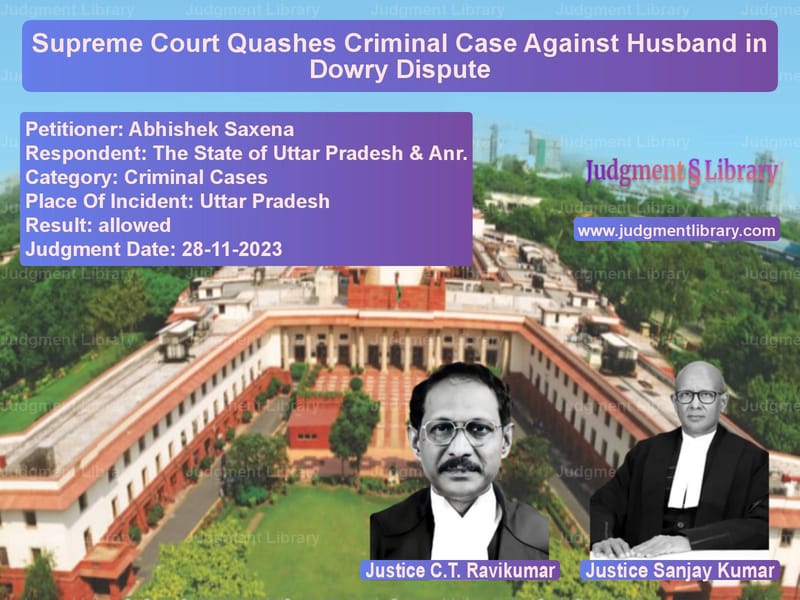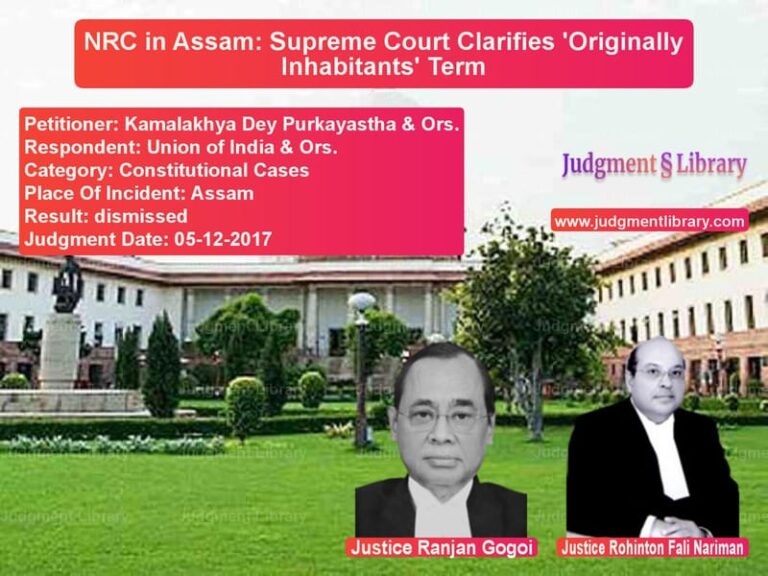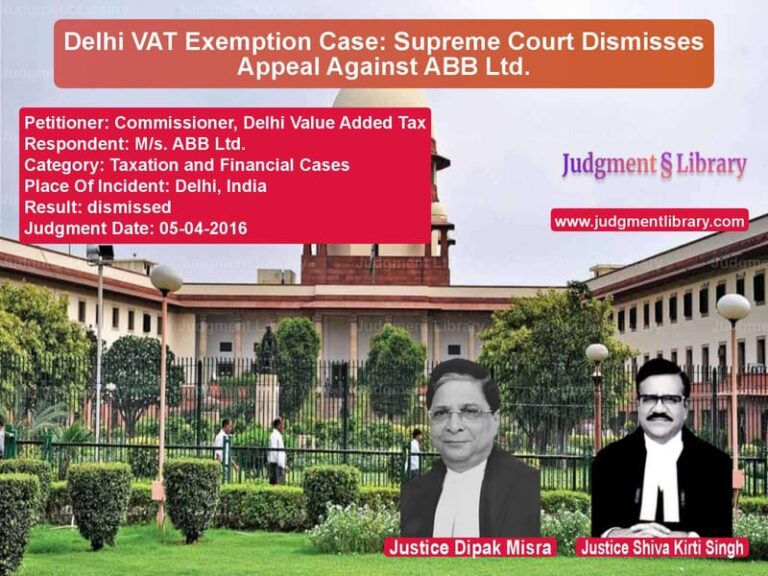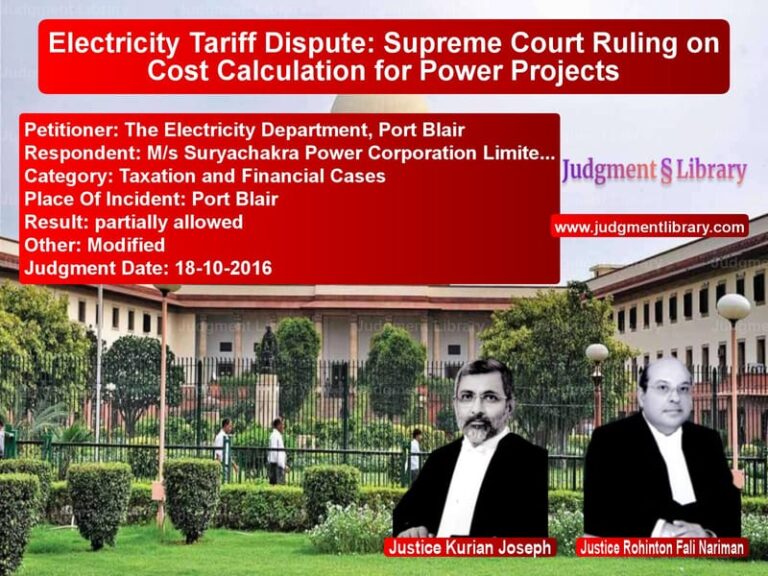Supreme Court Quashes Criminal Case Against Husband in Dowry Dispute
The Supreme Court of India recently delivered a significant judgment in the case of Abhishek Saxena vs. The State of Uttar Pradesh & Anr., addressing a criminal dispute arising from matrimonial conflict. The case revolved around allegations of domestic violence, extortion, and breach of trust, with the Court ultimately quashing the FIR and related proceedings against the appellant, Abhishek Saxena. The ruling underscores the importance of verifying the credibility of allegations before subjecting individuals to criminal prosecution.
Background of the Case
The case originated from a First Information Report (FIR) lodged by the appellant’s wife in Noida, Uttar Pradesh, under Sections 323 (causing hurt), 363 (kidnapping), 384 (extortion), and 406 (criminal breach of trust) of the Indian Penal Code (IPC). The allegations included claims of physical assault, financial extortion, and wrongful retention of the couple’s minor daughter by the appellant and his family members. A charge sheet was later filed under Sections 323, 384, and 406 IPC.
Read also: https://judgmentlibrary.com/supreme-court-revises-conviction-in-rajasthan-murder-case-key-takeaways/
The appellant sought relief under Section 482 of the Code of Criminal Procedure (CrPC) to quash the FIR, arguing that the allegations were baseless and filed with mala fide intent.
Arguments by the Petitioner (Abhishek Saxena)
The appellant’s counsel contended:
- The FIR was filed four months after the alleged incident, raising doubts about its veracity.
- The appellant had already filed a petition for divorce and custody of the minor daughter before the Family Court, indicating that the FIR was a retaliatory measure.
- The charge sheet failed to establish essential ingredients of the alleged offenses.
- The complainant had not provided medical evidence of injuries to support the charge under Section 323 IPC.
- No proof was provided regarding the alleged extortion of Rs. 20 lakh.
- The charge under Section 406 IPC lacked any evidence of misappropriation or dishonest conversion of entrusted property.
Arguments by the Respondents
The State of Uttar Pradesh, representing the prosecution, countered that:
- The FIR detailed serious allegations that warranted a full trial.
- Since a charge sheet had been filed, it was premature to quash the case without a detailed examination of evidence.
- The complainant had provided sufficient initial evidence for the case to proceed.
Supreme Court’s Observations
The Supreme Court conducted a thorough examination of the FIR, charge sheet, and other materials on record. It found that the allegations were vague and unsupported by tangible evidence.
Key observations of the Court:
- On the charge of causing hurt (Section 323 IPC): The complainant’s only statement regarding this allegation was that she was beaten when she inquired about her daughter’s whereabouts. The Court noted the absence of medical records, injury reports, or treatment details, concluding that the claim lacked credibility.
- On the charge of extortion (Section 384 IPC): The complainant alleged that Rs. 20 lakh was demanded as ransom for the child. However, she admitted in her statement that she had not filed any complaint regarding this demand in Bareilly, where it allegedly occurred. The Court found no evidence that the demand was made, let alone that any money was paid.
- On the charge of criminal breach of trust (Section 406 IPC): The complainant claimed that Rs. 5 lakh in cash and gold jewelry were taken from her. The Court found that there was no evidence of entrustment or misappropriation of these assets.
Additionally, the Court noted the sequence of events:
- The appellant had filed for divorce and custody of the child in May 2016.
- The complainant lodged the FIR in September 2016, months after the alleged incident.
- The delay in filing the complaint, coupled with the lack of supporting evidence, indicated that the case was likely motivated by personal disputes rather than genuine criminal conduct.
Key Excerpt from the Judgment
“Having gone through the chargesheet, and the other material on record, we could not find necessary ingredients to attract the offences under Sections 323, 384 and 406 of the I.P.C. qua the appellant.”
The Court emphasized that criminal law should not be used as a tool for personal vendetta and that a lack of prima facie evidence warranted the quashing of proceedings.
Final Judgment and Directions
The Supreme Court ruled as follows:
- The High Court erred in refusing to quash the FIR despite the absence of a prima facie case.
- The FIR, charge sheet, and all related criminal proceedings against the appellant were quashed.
- The appellant was granted full relief, and no further criminal action could be pursued against him based on the same allegations.
This judgment serves as a reminder of the need for due diligence in criminal prosecutions, especially in matrimonial disputes, where allegations may sometimes be motivated by personal grievances rather than legal merit.
Read also: https://judgmentlibrary.com/supreme-court-restores-bail-of-purushothaman-high-courts-order-quashed/
Petitioner Name: Abhishek Saxena.Respondent Name: The State of Uttar Pradesh & Anr..Judgment By: Justice C.T. Ravikumar, Justice Sanjay Kumar.Place Of Incident: Uttar Pradesh.Judgment Date: 28-11-2023.
Don’t miss out on the full details! Download the complete judgment in PDF format below and gain valuable insights instantly!
Download Judgment: abhishek-saxena-vs-the-state-of-uttar-p-supreme-court-of-india-judgment-dated-28-11-2023.pdf
Directly Download Judgment: Directly download this Judgment
See all petitions in Bail and Anticipatory Bail
See all petitions in Fraud and Forgery
See all petitions in Legal Malpractice
See all petitions in Contempt Of Court cases
See all petitions in Judgment by C.T. Ravikumar
See all petitions in Judgment by Sanjay Kumar
See all petitions in allowed
See all petitions in supreme court of India judgments November 2023
See all petitions in 2023 judgments
See all posts in Criminal Cases Category
See all allowed petitions in Criminal Cases Category
See all Dismissed petitions in Criminal Cases Category
See all partially allowed petitions in Criminal Cases Category







